Politics
Türkiye taking all measures after Israel-Iran tensions: FM Fidan
Foreign Minister Hakan Fidan said Türkiye has been taking the necessary measures in the aftermath of Israel’s attack on Iran and the latter’s possible response, as he called on Tel Aviv to abandon its strategy to destabilize the region.
Fidan’s statement came after a critical 4-hour meeting with Defense Minister Yaşar Güler and the head of the National Intelligence Organization (MIT), Ibrahim Kalın.
In his statement, Fidan said President Recep Tayyip Erdoğan has been closely monitoring Israel-Iran developments from the very beginning and is being kept informed.
“In line with his instructions, Türkiye’s relevant institutions are taking all necessary measures based on possible scenarios concerning our country,” Fidan said.
He continued by saying that Israel must immediately abandon its strategy of destabilizing the region, which has caused a humanitarian tragedy in Gaza, dragged Lebanon into instability, led to the occupation of Syria, and now targets Iran.
“We must not let growing tensions in our region to distract attention from genocide taking place in Gaza,” he said.
The meeting is focused on discussing the developments triggered by Israel’s airstrikes and their potential repercussions.
Fidan also held separate phone calls with his Iraqi and Jordanian counterparts regarding the developments.
He spoke with Iraqi Foreign Minister Fuad Hussein and Jordanian Foreign Minister Ayman Safadi amid rising regional tensions, following Israel’s large-scale assault targeting Iran overnight.
The officials exchanged views on the potential consequences of the escalation and stressed the importance of coordinated regional diplomacy to de-escalate the situation, according to sources.
Israel launched the large-scale attack on Iran earlier in the day, targeting the country’s nuclear and military facilities. Several senior Iranian military officials and nuclear scientists were also killed in the strikes. The wave of strikes is said to have continued.
Iran vowed “severe punishment,” and called for an emergency meeting of the U.N. Security Council.
Politics
TRNC president, UN chief to meet in New York
The U.N. secretary-general will meet with the Turkish Republic of Northern Cyprus (TRNC) President Tufan Erhürman in New York on Wednesday, a spokesperson for the global body said Monday.
“The meeting will be an opportunity to meet the new leader of the Turkish Cypriot community for the first time and to discuss the Cyprus issue,” Stephane Dujarric told a news conference.
Erhürman won the TRNC presidential election last October.
Dujarric also said that Guterres will also speak to Nikos Christodoulides, the Greek Cypriot Administration leader, “in due course.”
The U.N. spokesperson’s office also told Anadolu Agency (AA) in a statement that Maria Angela Holguin, the U.N. Cyprus envoy, held a meeting with the leaders of the TRNC and the Greek Cypriots in the island’s U.N.-controlled buffer zone.
“She continues to work with both leaders, including toward progress on the agreed trust-building initiatives, particularly the opening of additional crossing points, as soon as possible,” the statement added.
Cyprus has been mired in a decades-long dispute between Greek Cypriots and Turkish Cypriots, despite a series of diplomatic efforts by the U.N. to achieve a comprehensive settlement.
Ethnic attacks starting in the early 1960s forced Turkish Cypriots to withdraw into enclaves for their safety.
In 1974, a Greek Cypriot coup aimed at Greece’s annexation of the island led to Türkiye’s military intervention as a guarantor power to protect Turkish Cypriots from persecution and violence. As a result, the TRNC was founded in 1983.
It has seen an on-and-off peace process in recent years, including a failed 2017 initiative in Switzerland under the auspices of guarantor countries Türkiye, Greece, and the U.K.
The Greek Cypriot Administration entered the European Union in 2004, the same year that Greek Cypriots single-handedly blocked a U.N. plan to end the longstanding dispute.
Politics
US judge dismisses removal case against Turkish student held by ICE
A U.S. immigration judge on Monday terminated removal proceedings against Turkish graduate student Rümeysa Öztürk, ending the government’s effort to deport her nearly a year after her arrest by immigration agents, the American Civil Liberties Union (ACLU) said.
Özturk, a Tufts University Ph.D. student in child development, was detained by plainclothes Immigration and Customs Enforcement (ICE) agents in March 2025 in Somerville, Massachusetts, after co-authoring a pro-Palestinian opinion piece in a student newspaper. Her lawyers said the judge found that the Department of Homeland Security lacked legal grounds to remove her from the U.S.
“Today, I breathe a sigh of relief knowing that despite the justice system’s flaws, my case may give hope to those who have also been wronged by the U.S. government,” Öztürk said in a statement released by the ACLU.
She added that while the harm she endured could not be undone, the ruling showed “some justice can prevail after all.”
The Trump administration had argued that Öztürk was removable under the Immigration and Nationality Act, claiming her activities posed adverse foreign policy consequences and amounted to support for the Palestinian group Hamas. Öztürk’s lawyers have said the allegations were retaliatory and tied solely to her protected speech.
Following her arrest, Öztürk was transferred across multiple states – from Massachusetts to Vermont and later Louisiana – without prior notice to her attorneys, according to court filings. A federal judge in Vermont ordered her release on bail six weeks later.
Öztürk’s legal team challenged her detention as unconstitutional, arguing that it violated her First and Fifth Amendment rights.
In December, a federal judge ruled that the government had wrongfully terminated her student visa record, allowing her to resume her academic program. The government has appealed that ruling, though her visa record remains reinstated.
“The Trump administration has weaponized our immigration system to target valued members of our communities, including scholars like Rümeysa,” said Mahsa Khanbabai, one of Öztürk’s attorneys.
She said the case illustrated how immigration laws were used to silence advocacy related to Palestinian rights.
Jessie Rossman, legal director of the ACLU of Massachusetts, said the ruling highlighted the importance of judicial oversight in immigration cases.
“Without federal court jurisdiction, the government could punitively and unlawfully detain any noncitizen for months based solely on their speech,” Rossman said.
Öztürk’s separate civil lawsuit challenging her detention remains pending in the federal appeals court. She is among several international students targeted in the Trump administration’s crackdown on pro-Palestine campus activists, including Mahmoud Khalil and Mohsen Mahdawi.
The Trump administration has alleged that Öztürk, Khalil and Mahdawi engaged in activities supporting Hamas but has not presented evidence to substantiate the claims.
An unsealed State Department memo revealed last month that U.S. officials had no evidence against Öztürk beyond the article she co-authored for a student magazine, even as officials moved to revoke her student visa.
The internal memo, dated March 21, 2025, and unsealed by a federal judge, states that the Department of Homeland Security referred Öztürk for visa revocation after she co-authored an opinion piece in the Tufts student newspaper criticizing the school’s response to Israel’s genocidal war on the Gaza Strip.
U.S. Senator Ed Markey welcomed the judge’s decision while criticizing the case as unjustified from the outset.
“I’m grateful a judge has terminated removal proceedings against Rümeysa Öztürk. But let’s be clear: she never should have faced removal in the first place.
“Rümeysa is an example to us all of what it means to speak truth to power. Her courage and grace are inspiring,” Markey said on the U.S. social media company X’s platform.
Politics
AK Party says Istanbul polling shows rebound in voter support
The ruling Justice and Development Party (AK Party) said Tuesday that its support in Istanbul has increased, citing internal polling as party officials vowed to intensify preparations for upcoming national and local elections.
Speaking at a party meeting organized by the AK Party’s Istanbul branch at the Bahçelievler Congress Center under the theme “Being One in Istanbul,” Istanbul Provincial Chairman Abdullah Özdemir said surveys show the party’s vote share in the city has risen since last year’s elections.
According to Özdemir, an internal poll conducted one year after the most recent elections showed AK Party support in Istanbul at 35.5%. He said the latest figures put the party’s support at 41.7%. Özdemir added that while AK Party district municipalities received an average of 46.1% of the vote in the 2024 local elections, recent polling shows that figure rising to 51.8%.
The meeting reviewed party activities since the last provincial congress and outlined goals for the coming years. Attendees included former Istanbul founding chairman Alaattin Büyükkaya, lawmakers, mayors, district heads and party members.
Özdemir said the party’s guiding principle in Istanbul was unity, adding that the organization would “continue its work under the leadership of President Recep Tayyip Erdoğan.”
“We will be united, strong and resilient,” Özdemir said. “Together, we will be Istanbul; together, we will be Türkiye.”
He said Türkiye is navigating an extraordinary global period and highlighted that Ankara, under Erdoğan’s leadership, is working to promote peace in conflict zones worldwide.
Özdemir also sharply criticized Istanbul’s main opposition-led metropolitan administration, accusing it of mismanagement in areas including transportation, urban transformation and municipal services. He cited issues such as traffic congestion, fires involving public buses and problems in mass transit.
He said AK Party-led district municipalities and the central government have continued investing in Istanbul, including in transportation infrastructure, urban renewal, environmental projects, health care and education.
Referring to a recent advertising campaign launched by the party in the city, Özdemir said it had drawn strong reactions from the opposition-led municipality.
“We will not stop telling the truth,” he said. “We will continue to explain, everywhere and at all times, what has been done to Istanbul.”
Looking ahead, Özdemir said the party has finalized its road map for 2026 and beyond. He said the AK Party’s immediate goals include upcoming presidential and parliamentary elections, followed by elections for the Istanbul Metropolitan Municipality (IBB) and district mayoralties.
In presenting additional polling data, Özdemir said AK Party support in Istanbul stood at 32.6% when he took office and has since risen to 36.2%, excluding votes for its People’s Alliance partners. He expressed confidence that economic improvements expected in 2026 would further boost the party’s standing.
“We believe this momentum will continue,” Özdemir said.
Politics
Türkiye’s ‘family diplomacy’ makes waves across world
“Family diplomacy” takes center stage as Türkiye aims to raise awareness on the preservation of the family and strengthening this core element of society. The Ministry of Family and Social Services leads the efforts to that extent on an international level.
The ministry said in a statement on Monday that they have been active in international platforms to highlight the issue, especially in the face of global risks.
Türkiye joined a United Nations initiative in 2024 for family and, under the U.N. roof, hosted numerous international side events focusing on the protection of the family.
As part of these efforts, a call to mobilize around the foster family model was made at the 79th U.N. General Assembly, followed by an emphasis on family-inspired women’s entrepreneurship at the 69th session of the U.N. Commission on the Status of Women. In 2025, at the 80th U.N. General Assembly, a call was issued for global solidarity, starting from the family to counter emerging threats. In addition, the concept of “family-supported social development” was placed on the agenda at the second U.N. World Summit for Social Development.
Through Türkiye’s initiatives, cooperation frameworks on family and social policy were added to the agenda of the Organization of Turkic States (OTS). The first ministerial meeting in this field was held in Istanbul in May 2024, followed by a second meeting in June 2025 in Baku, Azerbaijan. Family and population issues were also incorporated into the working areas of the Economic Cooperation Organization under Türkiye’s leadership.
Within the scope of 2025 being designated the “Year of the Family,” the International Family Forum held in Istanbul in May brought together participants from 26 countries. An international symposium titled “Toward the Decade of Family and Population” was also held in Ankara.
Meanwhile, at Türkiye’s proposal, the Organization of Islamic Cooperation’s (OIC) 2026-2035 Action Program included “the protection of the family, generations and a strong population structure” as a distinct priority area. The United Arab Emirates (UAE), Nigeria, Egypt and the Turkish Republic of Northern Cyprus (TRNC) also declared 2026 as the “Year of the Family.”
As work continues on a draft resolution to declare 2026-2035 the “Decade of Family and Population” within the OIC, a separate draft resolution was adopted to protect young people’s rights in digital gaming and social media across member states.
During the tenure of Family and Social Services Minister Mahinur Özdemir Göktaş, 22 memoranda of understanding (MOUs) and four action plans related to family policies were signed with foreign counterpart institutions through international engagements. This figure represents 40% of all agreements signed since the ministry’s establishment.
Politics
No immediate threat of US-Iran war, diplomatic solution possible: Fidan
Foreign Minister Hakan said the ongoing tensions between the U.S. and Iran could be solved through creative diplomacy, after recent talks between the two countries.
Speaking on a live broadcast, Fidan said the emergence of a positive atmosphere after the first contact in a long while is significant for Ankara. He noted that a creative solution is needed and that both sides appear to show a willingness to work toward resolving the issue. He added that, for now, there does not seem to be an immediate threat of war.
“After the first contact following a long break, the emergence of a positive atmosphere is important for us. We need to find a creative solution, and we see that both sides have the will to resolve the issue. For now, it seems there is at least no immediate threat of war,” Fidan said.
The top Turkish diplomat said the Iran issue remains a central focus for Ankara, stressing that the region cannot withstand another war and that President Recep Tayyip Erdoğan is closely following the file.
He noted that Iranian and U.S. officials held rare talks in Oman two days ago, where Iran’s Foreign Minister Abbas Araghchi briefed counterparts on the discussions.
Fidan said that if a solution can be reached on the Iran file, other issues could also be brought to the table, noting that the nuclear dispute is primarily a matter between the U.S. and global security, while other topics are regional and not directly tied to U.S. security.
He said there is a belief that resolving the nuclear issue would make progress on other disputes easier and that Ankara has conveyed this view to both sides in an effort to establish a workable framework. Fidan added that this dynamic should not be seen as a surprise, as parties often prepare alternative scenarios where hostilities exist. He pointed to U.S. displays of pressure – such as deploying major fleets, bombers, and strategic assets – and Iran’s statements about increasing its missile numbers as signs that any potential confrontation would be costly for both. “First, it is about demonstrating strength; second, being prepared,” he said.
Regime change not possible in Iran
In response to a question about whether he thinks regime change could be possible in Iran through U.S. airstrikes, Fidan said regimes do not change through airstrikes.
“I don’t think regime change is possible in Iran,” he said.
Fidan dismissed the idea of regime change in Iran as unrealistic, saying such expectations amount to “an empty dream.”
He said a more plausible scenario would be a government weakened by its inability to provide public services, prompting the existing leadership to make radical decisions and adjust course. He noted that discussions take place on two levels – formal talks and more candid exchanges – and argued that the problem lies not in Iran’s system itself but in the decisions and policies it pursues.
Fidan said Iran’s long-standing revolutionary cadre continues to govern the country with an approach shaped by the 1979 revolution rather than a conventional nation-state model, creating structural challenges.
While Iran is not building a bomb, Fidan said, it is developing capabilities close to it, which exposes the country to sanctions. “People misunderstand this,” he said. “They are not producing a bomb, nor is there evidence they intend to, but they are enriching uranium to a level that raises concern. The issue at hand is uranium enrichment.”
Fidan recalled that Iran was struck while negotiations were ongoing and described how, during the 12-day June war, Washington warned Ankara that “anything could happen within hours,” even as talks were scheduled.
“The U.S. was the one talking; Israel was the one striking,” he said, adding that conditions may be different this time and that Türkiye is doing all it can to avert a catastrophe. He noted that Iran has its own decision-making structure, with established rules for negotiations, including location, modality, and participants. Ankara proposed a different method, encouraging Iranian and U.S. officials to meet face-to-face instead of speaking through a mediator in separate rooms, but Iran opted to continue the system used in Oman and that Ankara respects the choice of its neighbor.
Fidan said Iran faces major existential challenges and that Türkiye held extensive consultations in early February with regional partners, including Qatar, Saudi Arabia, Egypt and the United Arab Emirates, all of whom showed strong interest. He added that during discussions on the Palestine issue, Türkiye brought regional countries together around shared ideas and delivered a strong diplomatic effort. “We suggested showing the same kind of solidarity on the Iran issue,” he said, proposing a joint platform to build consensus and present a unified message to the parties. He noted that the United States welcomed this approach, saying it had proven effective in Gaza by fostering regional ownership and coordinated action. “We are moving forward as a strong team,” Fidan said, “but the challenges remain substantial.”
‘Restoring regional cooperation vital’
Fidan said the region needs stronger cooperation platforms, stressing that the most urgent requirement is for regional countries to restore mutual confidence.
He noted that this trust deficit must be addressed and added that President Erdoğan’s perspective focuses on institutionalizing regional solidarity in the military, political and economic fields. He continued by saying that ongoing discussions on these ideas are important and that several advanced proposals are now on the table. He added that he expects developments in the near future that will contribute to regional stability.
Dialogue rather than bloodshed necessary in Syria
Fidan said limited progress has been made on preserving the unity and territorial integrity of Syria, but stressed the importance of advancing the process through dialogue rather than bloodshed.
He noted that although more work remains, the withdrawal of the terrorist PKK’s Syrian offshoot, YPG, from occupied areas and its repositioning in predominantly YPG/PKK-held regions marks an improvement compared to earlier maps.
Still, he said, additional steps required under existing agreements must be completed, as mistrust persists on both sides. Fidan argued that the YPG must undergo a historic transformation, adopting a more realistic, Syrian-oriented posture that does not threaten the security of Iraq or Türkiye and is not aligned with the goals of the PKK. Such a shift, he added, would create space for legitimate political engagement by Kurdish communities. He said Türkiye has conveyed this message to President Bashar Assad as well and will follow the process closely, emphasizing that equal rights for all Syrian citizens are essential.
Fidan added that Kurdish communities had little opportunity to engage with Damascus due to years under different controlling forces but are now gradually reconnecting. Türkiye, he said, has long taken a sensitive approach toward Syrian Kurds, raising their lack of citizenship and sense of belonging in past meetings with Assad. He noted that toxic narratives have taken root, including PKK-driven claims portraying all Sunni Arabs as Daesh members, and opposing narratives portraying all Kurds as PKK or YPG. These, he said, must be isolated. Fidan praised the stance of Ahmet Şara and his colleagues, saying they did not oppress civilians, and expressed hope that this chapter will close in a way that benefits both Kurds and Arabs, alleviates Türkiye’s security concerns, and helps Syria move toward a more stable future.
Earlier on Monday, Fidan spoke by phone with his Iranian counterpart, discussing ongoing nuclear negotiations, according to Turkish diplomatic sources.
Türkiye was named as one of the potential venues for direct talks between Iran and the U.S., after U.S. President Donald Trump threatened to strike Iran following weeks of deadly protests in Türkiye’s eastern neighbor. Iran said last Wednesday that the talks would take place in Oman’s Muscat on Friday amid rumors that negotiations may collapse due to disagreements about the format and the venue.
Ankara, which maintains close ties with Iran and the U.S., has advocated dialogue since tensions gradually escalated over the past few weeks. President Recep Tayyip Erdoğan conducted phone diplomacy with both Trump and Iranian President Masoud Pezeshkian during the crisis, while Araghchi met his Turkish counterpart Fidan in Istanbul in January.
Politics
Turkish army joins biggest NATO exercise with 2,000 personnel
NATO stages its biggest exercise this year in Germany, with some 10,000 personnel from 11 countries. Türkiye, which has the defense body’s second-largest army, dispatched 2,000 personnel for Steadfast Dart 2026, which began on Sunday. The exercise, which will continue until Feb. 20, aims to showcase NATO’s ability to deploy rapidly and conduct complex operations, the body said in a statement earlier this month.
It is the first time that Türkiye sent so many troops to Northern Europe, though the country is a major component of NATO at a time of heightened defense worries in Europe.
Türkiye aims to demonstrate its locally made weapons systems at the exercise in Germany. The country plays a strategic role in the Allied Reaction Force (ARF) that will test NATO’s readiness in a simulated conflict scenario.
The 66th Mechanized Infantry Brigade Command of the Turkish army will be among those representing the country at the exercise. Soldiers from the command’s base in northwestern Türkiye’s Tekirdağ province left for Germany on Saturday after a ceremony. Speaking there, the brigade’s commander, Brig. Gen. Hulusi Koçbay, said that the exercise would involve simultaneous use of land, air and naval vehicles and that they had contributed 650 personnel and 149 vehicles to the exercise, pointing out that they would use locally produced weapons and equipment. He said the TCG Anadolu vessel of the navy and a civilian transportation ship left Türkiye on Jan. 20 for the deployment of vehicles and munitions and already arrived at Germany’s Emden port.
“We will conduct joint training with other countries in several fields for combat and improve our cooperation abilities within NATO. We are ready to conduct any tasks we are assigned to demonstrate efficiency and visibility of our Land Forces in NATO,” he said. The combat group consists of a motorized infantry battalion, an artillery battery, an engineer combat company, a maintenance unit and a field service company.
Türkiye played a critical role in the Western-centric bloc, which expanded its influence across Europe. Commanding one of the strongest armies in the alliance, the country is also a key member of NATO due to its location on the southeastern tip of Europe, at the gateway to Asia for Europe.
Although it has started courting NATO’s traditional rivals more in recent years, Türkiye is firmly aligned with the alliance, as its leaders repeatedly confirmed. Türkiye’s membership is viewed as winning a reliable ally in NATO’s southern wing in terms of air, land and maritime defense. The country is already in the top five countries contributing to NATO’s operations and missions.
Türkiye’s strategic location makes it the first defense against threats and risks in the region for NATO, while the alliance is an essential component in Türkiye’s security and defense. The country particularly proved its worth to the alliance, which sees terrorism as one of the main threats.
In the Balkans, Türkiye is the top contributor to the alliance’s Kosovo Force (KFOR), which maintained command of the forces between 2023 and 2024. It currently holds deputy command of the force, while it was the top contributor to the reserve battalion in Kosovo to ensure the security of the Balkan country and the region.
It is also a top contributor in terms of personnel to NATO’s Iraq mission, which was founded in 2018 to provide consultancy and training to Iraqi security forces.
In NATO’s military exercises, Türkiye is a prominent actor. It also commands NATO’s permanent maritime task group and a task group against naval mines.
The country provides financial and personnel support to NATO, primarily for building defense capacity. In 2024, it became one of 24 NATO members achieving a 2.09% goal in the proportion of estimated defense expenditures to gross domestic product (GDP). Türkiye ranks eighth among the top contributors to NATO in contributing to joint funds, at 4.59%, and seventh in terms of personnel contribution to the alliance’s entire cadres.
Türkiye also hosts critical NATO facilities, including Allied Land Command, which is located in the western city of Izmir, and Rapid Deployable Corps, which is based in Istanbul. In the capital, Ankara, it hosts the Centre of Excellence for Defence Against Terrorism (COE-DAT) and the Partnership for Peace Training Center. Istanbul hosts the NATO Maritime Security Centre of Excellence (MARSEC COE).
The country’s rapidly growing defense industry makes it a valuable member of the alliance in terms of innovation and production in the industry. This has become especially prominent in light of the ongoing conflict in Ukraine and the beginning of the second Trump era in the U.S., bringing the “strong defense industry” element to the forefront of the alliance’s agenda. In addition to being NATO’s second-largest army, Türkiye has solidified its privileged position in recent years with advancements in its defense industry, producing a wide range of military products and equipment.
Its innovative defense industry has gained significant attention from both NATO and allied countries. The use of Turkish-made drones by Ukraine has underscored this.
-
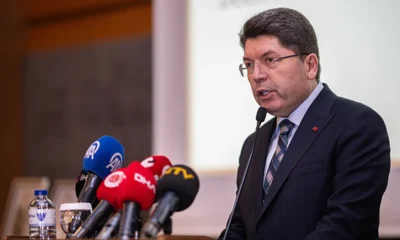
 Daily Agenda2 days ago
Daily Agenda2 days agoMinister of Justice Tunç: “The regulation regarding children involved in crime will come to the parliament after the commission works are completed.”
-
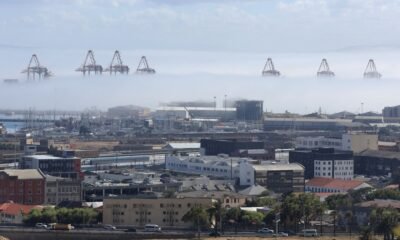
 Economy2 days ago
Economy2 days agoFacing US tariffs, South Africa steps toward trade deal with China
-
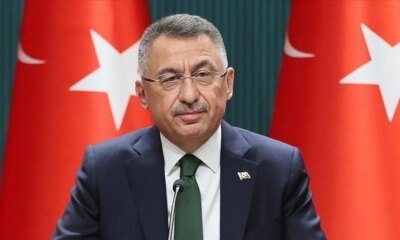
 Daily Agenda1 day ago
Daily Agenda1 day agoParliamentary Foreign Affairs Committee is going to the USA! Fuat Oktay: The constructive attitude of the congress is of critical importance in Türkiye-US relations
-
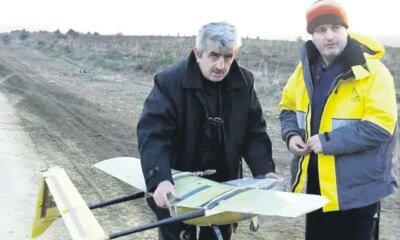
 Daily Agenda2 days ago
Daily Agenda2 days agoA Akıncı passed from this world
-
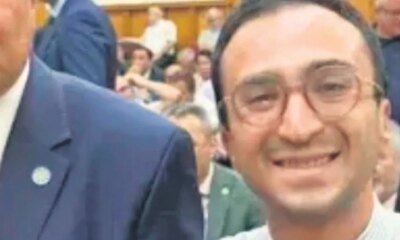
 Daily Agenda1 day ago
Daily Agenda1 day agoImmoral and excessive attack on women
-

 Sports2 days ago
Sports2 days agoTurkish center Alperen Şengün named in 2026 NBA All-Star
-
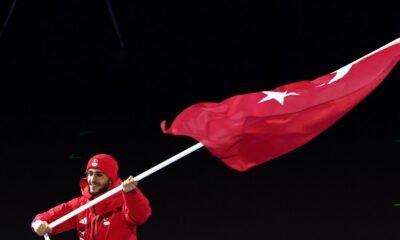
 Sports23 hours ago
Sports23 hours agoAkar carries Türkiye’s hopes into Olympic short track spotlight
-
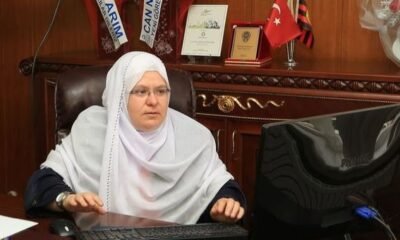
 Politics23 hours ago
Politics23 hours agoArrest, outrage after far-right man targets Turkish mayor’s dress




